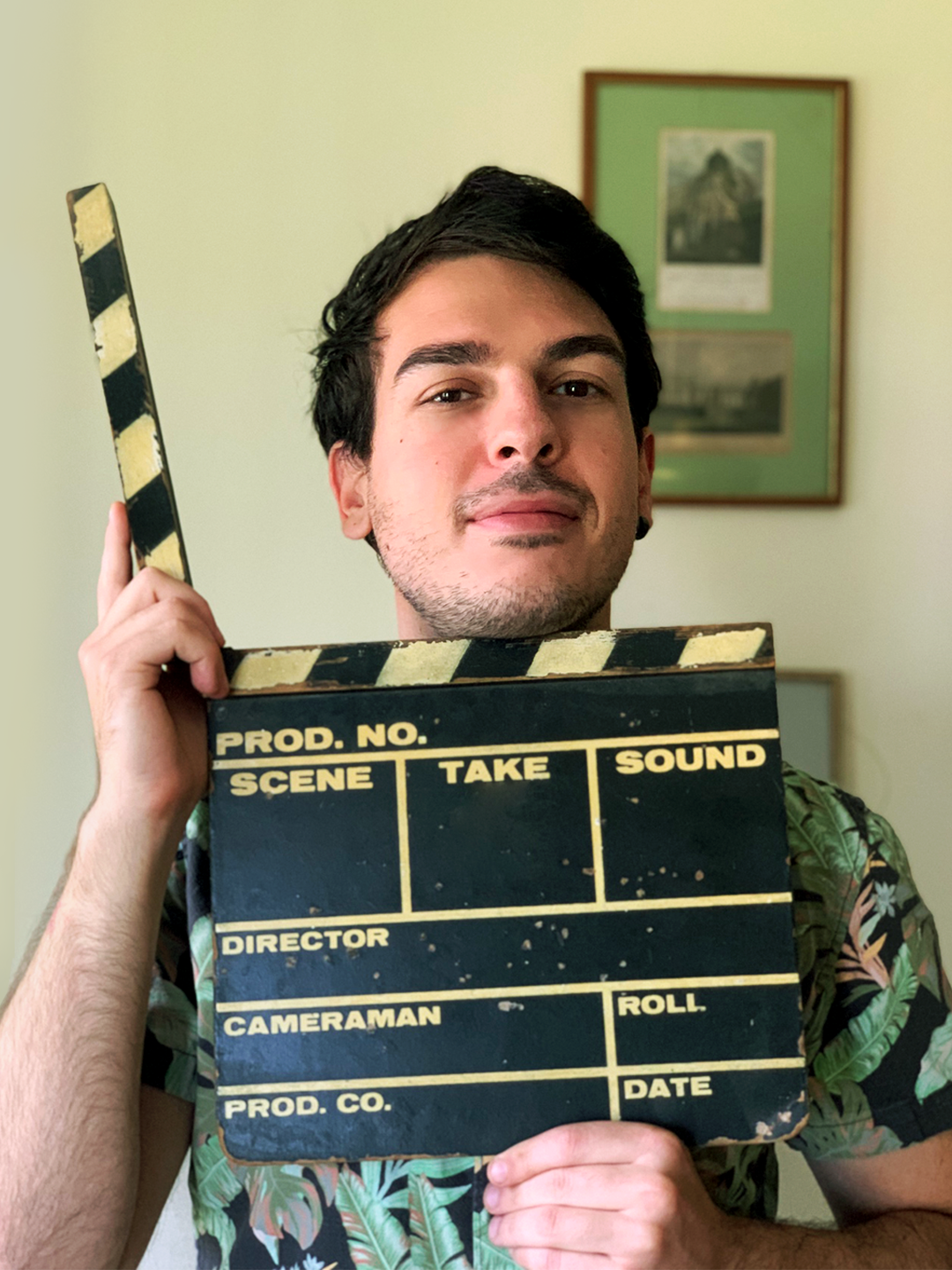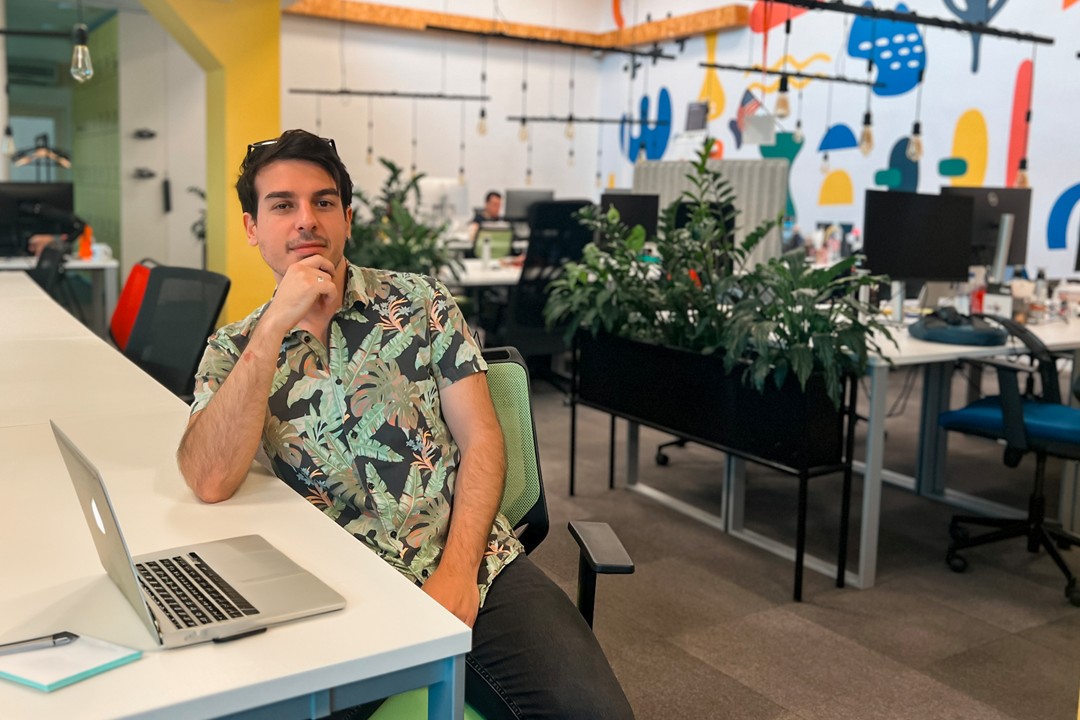What most coworkers at tershouse will agree with is that Deni is a very versatile young man. Photography, film, art in general, psychology, marketing, martial arts, culture...He grew up in various environments and that left a lot of marks on his way of thinking, but also on his perception of the world and people. He will listen with sincere interest and patience if someone has a different view on a certain topic, but also listen carefully if you have a problem. He says that in his private life, he is completely different from how others know him - as an extroverted, very sociable person.
Life circumstances wanted Deniz (with Z) to be born in the South African Republic - Durban, but to grow up in Los Angeles. "My father is an architect and he got a job in South Africa before the war in BiH started, and when it started we immediately moved there. After two years, since the uprisings surrounding the fall of apartheid had already started, we decided to move to Los Angeles. There I formed a way of thinking that is still present today. My best friends were from Venezuela, Kenya, and Polynesia and I grew up in a culturally diverse environment, where we were all so different but still the same, and that's what shaped me but also what reminds me a lot of the community at tershouse.”
In Los Angeles, he grew up in a neighborhood called Studio City - for a reason, because the biggest production companies are located there. As he says, he was a real Californian kid who loved skateboarding and surfing, and in that period he also began to develop an interest in film that would not pass him by coming to Bosnia and Herzegovina. "After 10 years in L.A., dad decided in 2003 that we should return to BiH. I remember how I explained to my friends where the country I came from and to which I was returning was located, although it wasn't really clear to me either. I remember how the Bosnian language sounded to me when I first came to BiH - a strange mixture of French and Russian. It was difficult for me to get used to living here because of the big difference in lifestyles. Remembering that period now, I wouldn't change anything; by coming to BiH, I built my own path and gained a perspective that I wouldn't have had if I had stayed there, where I would have been just another "California kid."

We continue to talk about the period of growing up in America and what he remembers as significant for today's life and his profession. Deni says that one thing we all need to learn from the Americans is how to do marketing because they are simply fearless at it. "In BiH, marketing is, in my opinion, taken lightly. Marketing propaganda is literally programming the human brain. If you want a successful campaign, something that will enter pop culture, I think you have to take a serious approach to psychology. As a marketing designer, I look at what a visual consists of; from color, text, to where something is located. Everything is important and affects how it will be perceived. In domestic marketing, there is a lack of imagination and willingness to take risks. We are playing it safe. I think people like it when they’re challenged with something. The biggest campaigns are always the ones that are controversial."
Deni's first real job, he says, was photoshopping models when he was 17 years old. "My perception of reality changed dramatically after this experience because I realized how much work is behind someone's beauty as we see it." After that, he had the opportunity in cooperation with the BiH Art Gallery to enter the world of graphic and product design. A significant work experience for him was also working on a feature film. "All these experiences were equally important for what I do today, but I believe that in addition to everything I've done and tried my hand at, writing and storytelling is the freest form of creative expression. Human stories are essential to our evolution. If we didn't have stories from the past, we would never have mastered some lessons and gained a different perspective." I asked him, of course, what, in his opinion, makes a good story." For me, a good story is one that is true. Also, whoever wants to engage in story telling must write about something they know about. People know very quickly when something is bull*hit and when something is outside of your field of expertise." Talking further about the artists who influenced him the most, he points out that it is Martin Scorsese, who confirms through his films that stories must come from an honest place. "In terms of literature, definitely Ernest Hemingway. Some of the first books I read were his. He writes in a short and clear way, to the point."
Ever since he was very young, he knew that he would do a creative job. I ask him what happens when he encounters a creative block. Where then? "I practice meditation and sometimes even that is not enough. Whenever I encounter a creative block, it is important not to force things. I leave everything. Sometimes it's a couple of hours, sometimes a whole day. You have to learn not to fixate on the issue, but just to let it go."
Finally, I asked him what other life experiences shaped him into the person he is today. A person whose company is rarely not enjoyed by someone. "When I was younger, I practiced martial arts, not to become dangerous or the strongest, but to overcome myself and my own fears. In addition, martial arts taught me to focus, discipline, control of emotions and thoughts, strengthened self-confidence, but probably also the most important life lesson, which is that you should not do anything when you are angry and nervous because then you have a kind of blindfold that prevents you from seeing clearly. Martial arts taught me many important lessons, which I apply today in a professional context as well."
Towards the end of the interview we started with deeper topics, Iand ask him what he thinks the purpose of life is in general. "I think that life has no meaning, but we are the ones who give it meaning through our work, and through our daily efforts to be good people."






